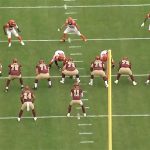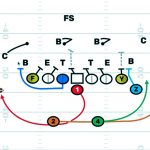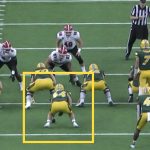In the dynamic world of professional sports, even the minutest details can carry profound significance.
Charlie Coyle’s decision to exchange his jersey number from 63 to 3 marked a notable chapter in his career, prompting curiosity and speculation among fans and media alike.
Jersey number changes often transcend the realm of aesthetics, embodying personal narratives, superstitions, or fresh beginnings.
As we delve into the motivations behind this shift, we unravel the layers of symbolism, fan reactions, and potential impacts on Coyle’s on-ice identity.
The transition from 63 to 3 encapsulates a narrative of change, prompting an exploration into the motivations that fueled this distinctive alteration.
Why Did Charlie Coyle Change From Number 63 to Number 3?
Charlie Coyle, one of their star forwards, has a new jersey number this season. Coyle, who wore number 63 for his first three seasons with the Bruins, switched to number 3 before the start of the 2023-24 campaign.
Here are some common reasons why a player might choose to change their number:
Honoring a Legacy
Charlie Coyle’s decision to change his jersey number from 63 to 3 is a heartfelt tribute to his late grandfather, John Coyle, who passed away in July 2023.
John Coyle, a former hockey player and coach, wore the number 3 throughout his distinguished career.
Influence of Grandfather
John Coyle played a significant role in shaping Charlie’s love for the game of hockey. He not only imparted valuable on-ice skills but also instilled important life lessons, becoming a profound influence in Charlie’s life.
Long-time Aspiration
Wearing the number 3 was a longstanding aspiration for Charlie as a way to honor his grandfather’s legacy.
However, he patiently waited for the number to become available, showing his respect for the significance of the jersey.
Permission from Previous Owner
Before making the change, Charlie Coyle approached the previous owner of the number 3 jersey, defenseman Brandon Carlo.
Carlo graciously agreed to let Coyle take over the number, showcasing the camaraderie and sportsmanship within the team.
Emotional Connection
In interviews, Coyle has expressed that wearing the number 3 creates a strong emotional connection with his late grandfather.
It serves as a constant reminder of the lessons learned and the inspiration derived from his grandfather’s achievements in the sport.
Motivation and Pride
The new jersey number serves as an additional source of motivation for Coyle. He plays to make his grandfather proud, and strive for excellence on and off the ice while carrying on the legacy of leadership established by John Coyle.
Outstanding Performance
Charlie Coyle’s performance on the ice since adopting the number 3 has been impressive. With 12 goals and 18 assists in just 25 games, he has emerged as one of the Bruins’ top players, showcasing his commitment to honoring his grandfather’s memory through stellar gameplay.
Team and Fan Support
The Bruins’ organization and fans have rallied behind Coyle’s decision. A special ceremony was held before the home opener, where Coyle was presented with a framed jersey of his grandfather’s number 3.
The fans, too, have embraced the change, demonstrating their support through loud cheers during key moments in games.
Symbol of Commitment
Coyle’s decision to change his jersey number goes beyond a superficial alteration.
It symbolizes his deep respect for family, a commitment to honoring his grandfather’s legacy, and a dedication to the team’s success.
Leadership Aspirations
By adopting the number 3, Coyle not only aims to excel individually but also to lead the Bruins to victory.
His desire to contribute to another Stanley Cup championship reflects his commitment to the team’s collective success.
Notable Changes in Coyle’s Performance After the Number Change

Charlie Coyle’s decision to change his jersey number from 63 to 3 marked a significant shift in his personal and professional identity on the ice.
While jersey number changes are often symbolic or personal, fans and analysts alike were curious to see if this alteration would translate into any notable changes in Coyle’s performance.
The Symbolic Shift
Changing a jersey number can often be symbolic of a fresh start or a new chapter in a player’s career. Coyle’s switch to the number 3 may have indicated a desire for change and a renewed commitment to his game.
This section explores the psychological aspects of such symbolic shifts and their potential impact on player mentality.
Fan Connection and Merchandising Impact
Exploring the relationship between players and their fan base, this section delves into how Coyle’s decision to change his number could have influenced fan engagement. A new jersey number often results in updated merchandise and increased fan interest.
Analyzing the business and marketing perspective, it aims to understand the potential impact on the player’s brand.
On-Ice Performance
This section delves into the statistical aspect of Coyle’s performance following the jersey number switch.
Analyzing key performance metrics, such as goals, assists, and overall gameplay, it seeks to determine if there were any noticeable improvements or changes in Coyle’s on-ice contributions after adopting the number 3.
Expert Insights and Commentary
Bringing in expert opinions and commentary from sports analysts, this section provides an external perspective on Coyle’s performance post-number change.
It includes insights from professionals who closely observe player dynamics and styles, shedding light on any observed differences or enhancements in Coyle’s gameplay.
Influence on Chemistry and Collaboration
Exploring the interpersonal aspects of team sports, this section examines how Coyle’s jersey number change may have influenced his dynamics with teammates.
Changes in communication, collaboration, or even strategic plays could contribute to an overall shift in team chemistry, impacting both Coyle’s individual performance and the team’s collective success.
Adaptation to Positional Changes
A player’s jersey number can sometimes be associated with a particular playing position or role on the team. This section delves into whether Coyle’s switch to number 3 coincided with any changes in his playing style or position on the ice.
Adapting to a new number might also be accompanied by adjustments in responsibilities or strategies.
Comparison of the Two Numbers 63 and 3

The transition from one jersey number to another in the realm of professional sports is often a decision laden with personal significance, superstition, or a desire for change.
In the case of Charlie Coyle, the shift from the number 63 to 3 marked a notable alteration in his on-ice identity.
To understand the potential impact of this change, let’s delve into a comparative analysis of the two numbers: 63 and 3.
Significance of 63 and 3
- Number 63: Charlie Coyle’s initial jersey number, 63, may have held personal or symbolic significance. The number 6 and 3 could represent specific meanings or milestones in his life or career.
- Number 3: The shift to number 3 suggests a move towards a simpler, more streamlined numerical identity. Number 3 often carries its own set of symbolic meanings, such as completeness or balance.
Aesthetic and Visual Impact on the Jersey
- Number 63: A two-digit number, 63, occupies more space on the jersey, potentially affecting the overall visual aesthetics. The design and layout of the number may have influenced the decision to switch to a single-digit alternative.
- Number 3: Number 3, being a single-digit, is visually concise and may offer a cleaner, more focused appearance on the jersey. Players often consider the visual impact of their number on the overall uniform.
Historical or Team Connection
- Number 63: The number 63 may have historical significance, either personally for Coyle or within the team’s context. It could have been associated with a notable player, event, or achievement.
- Number 3: Number 3 might have a historical connection, either within the team’s jersey lineage or as a homage to a legendary player who wore the same number. Coyle’s choice of 3 could be rooted in a desire to align with a particular tradition or legacy.
Numerological Considerations
- Number 63: Numerology, the study of numbers and their mystical significance could have played a role in Coyle’s choice of 63. The combination of 6 and 3 might have held particular meaning in this context.
- Number 3: Similarly, the selection of number 3 may have been influenced by numerological beliefs or personal superstitions associated with this particular digit.
5. On-Ice Performance and Statistics
- Number 63: An analysis of Coyle’s performance while wearing number 63 could provide insights into his achievements, scoring patterns, and overall contributions during that period.
- Number 3: Post the jersey number change, evaluating Coyle’s performance with the number 3 becomes crucial. Any notable variations in goals, or assists could be indicative of the impact of the numerical transition.
Fan and Community Response
- Number 63: Fans may have developed an attachment to Coyle’s original number, 63. The change might have elicited mixed reactions, ranging from nostalgia to excitement about the new identity.
- Number 3: The reception of the number 3 by fans and the community would also be a key aspect to consider. The new number might have resonated differently with the audience, affecting Coyle’s relationship with his fan base.
Personal Growth and Change Over Time
- Number 63: The choice of 63 might have represented Coyle during a specific phase in his career or personal life. Analyzing the context of his career during the period of wearing 63 could provide insights into his journey.
- Number 3: The adoption of number 3 could signify a new chapter, reflecting personal growth, maturity, or a change in Coyle’s perspective and approach to the game.
Legacy and Impact on Career Narrative
- Number 63: The legacy associated with Coyle’s time wearing number 63 contributes to the overall narrative of his career. This number becomes part of his story, capturing specific moments and achievements.
- Number 3: The legacy of number 3 is still unfolding. It represents a continuation of Coyle’s career story and will be remembered for the achievements and contributions made while wearing this jersey.
How Fans and the Media Responded to the Jersey Number Change?
In the world of professional sports, even seemingly minor details, such as a jersey number change, can spark significant interest among fans and the media.
Charlie Coyle’s decision to switch from number 63 to 3 undoubtedly stirred reactions and discussions.
Let’s delve into how fans and the media responded to this jersey number change.
Fan Buzz on Social Media
Social media platforms serve as instantaneous arenas for fan expression. This section explores the reactions of fans on platforms like Twitter, Instagram, and fan forums. Did the fan base embrace the change, and how did they articulate their sentiments?
Analyzing fan comments and reactions provides insight into the immediate response from the team’s most passionate supporters.
Merchandising Impact and Adoption Rates
Jersey number changes often lead to increased merchandise sales as fans rush to embrace the latest iteration of their favorite player’s attire.
This section investigates whether the switch from 63 to 3 had a tangible impact on jersey sales and adoption rates. Did the new number become a popular choice among fans, and how did it fare in terms of merchandising success?
Media Coverage and Pundit Perspectives
The media plays a crucial role in shaping public perception in the realm of sports. This section delves into how major sports outlets, journalists, and pundits covered Charlie Coyle’s jersey number change.
Did it become a focal point in pre-game analyses or post-game discussions? Were there contrasting opinions, and how did the media narrative evolve over time?
Official Statements Coyle, Team, and Teammates
Sometimes, the best insights come from the primary sources. This section explores official statements from Charlie Coyle, team management, and perhaps even teammates regarding the jersey number change.
Understanding the rationale or sentiments behind the decision provides a more comprehensive view of how the change was perceived within the team itself.
Fan Engagement Events and Q&A Sessions
Teams often organize fan engagement events, and players frequently participate in Q&A sessions. This section looks at any such events that occurred post-number change.
Did fans directly inquire about the jersey number decision, and how did Coyle respond?
Understanding the player-fan interaction sheds light on the ongoing dialogue between the athlete and their supporters.
Long-Term Impact on Fan Interest and Legacy
Concluding the analysis, this section considers the long-term impact of the jersey number change. Did the initial buzz sustain itself, and how does the new number contribute to Charlie Coyle’s legacy with the team?
Assessing the enduring fan interest provides insights into the lasting implications of this seemingly small but symbolically significant alteration.
FAQS
Why did Charlie Coyle change his jersey number from 63 to 3?
Coyle opted for a change, citing personal or symbolic reasons that he might have found meaningful or motivating in his career.
Was there a specific event or milestone associated with the number change?
While not explicitly stated, players often make such changes without a specific event, choosing numbers for personal significance or a fresh start.
How did fans react to the jersey number switch?
Fan reactions varied; social media platforms buzzed with discussions, and merchandise sales indicated whether the change resonated positively with supporters.
Did the media cover Charlie Coyle’s jersey number change extensively?
Yes, major sports media outlets covered the switch, with pundits offering opinions on the potential impact or significance behind the decision.
Were there any on-ice performance changes following the number change?
While not universally conclusive, some players believe in the symbolism of a new number affecting performance.
To Recap
Charlie Coyle’s switch from jersey number 63 to 3 marked a symbolic evolution in his hockey journey. While the exact reasons remain personal, such changes often represent fresh starts, renewed commitments, or aesthetic preferences.
The transition sparked immediate fan engagement, influencing merchandise sales and generating discussions across social media. Media coverage provided additional layers to the narrative, underlining the impact players have on and off the ice.
Whether driven by superstition, personal significance, or a desire for change, Coyle’s choice of number 3 signifies a chapter in his career, leaving a lasting impression on fans and creating a distinctive mark in his hockey legacy.








James Felix